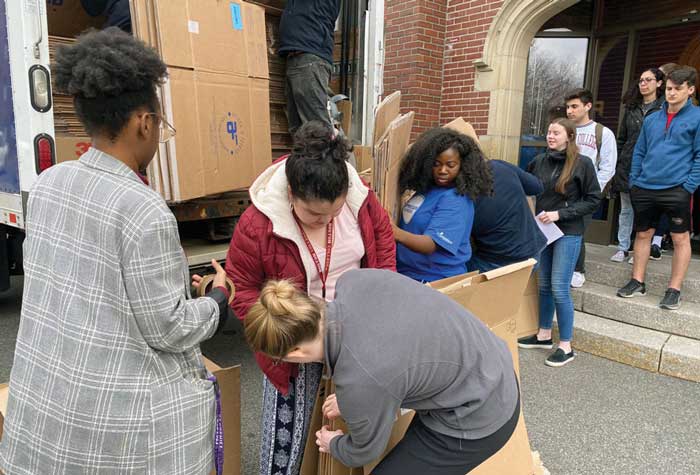
Can Erbil used his homemade lightboard to explain concepts to his economics students via Zoom.
Continuing Education
Amid a global pandemic, Boston College faculty found innovative ways to teach classes and connect with students online.
Emily Prud’hommeaux had a plan. During spring break, the Gianinno Family Sesquicentennial Assistant Professor of Computer Science had followed the spread of Covid-19 and emailed with colleagues. It was impossible to predict exactly how the pandemic would affect Boston College, of course, but Prud’hommeaux understood that there could be a need to bring her classes online.
So when Prud’hommeaux, who had never before taught online, returned to campus on March 9, she began preparations for the shift by delivering her Computer Science II lectures on the video-conferencing platform Zoom. As it turned out, Prud’hommeaux’s concerns proved prescient—BC, like colleges and universities around the country, halted in-person teaching two days later and then, on March 19, shifted completely to remote learning. There may be nothing that can replace the quality and intimacy of the in-class learning experience, but Prud’hommeaux was heartened by the level of instruction that can be achieved online.
“We can do something different,” she said. “We can adapt. And maybe there are some things that we can learn from this experience.” In addition to Zoom meetings, Prud’hommeaux offered virtual evening office hours for students in faraway time zones, and collaborated with students on coding projects via Atom, an open-source editor.
Prud’hommeaux was just one of the more than eight hundred full-time faculty members who provided classes to BC students scattered around the globe. “It was great to hear reports of deep and sustained engagement with course material,” said Provost and Dean of Faculties David Quigley. “I enjoy knowing that the wonderful spirit of the Boston College classroom—marked by curiosity, rigor, and openness—echoed around the nation and across the world, helping bring some light into a dark time for so many.”
To help hundreds of faculty members, with varying degrees of technological know-how, successfully bring their classes online, BC’s Center for Teaching Excellence, Center for Digital Innovation in Learning, and Information Technology Services all worked together, ensuring that professors from across the University were able to deliver top-quality online instruction. “We wouldn’t have been able to make the leap without two things: an existing foundation of good technology and teaching practices, and the fantastic partnership of these three groups. And, of course, our great faculty really made it all happen,” said Vice President for Information Technology Michael Bourque.
CTE and CDIL offered training sessions on Zoom and other online tools for each department at BC, and led hundreds of one-on-one training sessions with professors in the ramp-up to the March 19 move online. Their work centered on helping faculty to build on teaching structures they already had in place, revisit their goals given the new classroom environment, and focus on maintaining a human connection in the digital space.

FROM LEFT: Emily Prud’hommeaux, Michael Bourque, and Stacy Grooters.
The shift was rapid, but teaching often has to adapt to a changing world, said Stacy Grooters, the interim director of CTE. “Frankly, this is what teaching is always about,” she said. “You figure out the context in which you’re teaching and you have to meet the challenges where they are.”
Brainstorming with instructors about how to keep students engaged in a Zoom environment was paramount, said Bryan Blakeley, executive director of CDIL. “One big thing we had to figure out early on,” he said, “was what kind of options did we need to make available to faculty in terms of technology that would both nudge them toward the interactive pedagogies that they might use in the classroom, but would also allow them to replicate some of the practices that they were counting on, like exams.”
Effective and meaningful instruction took many different forms during the extraordinary spring semester. Lab-science instructors created high-quality virtual experiences for STEM students, while professors of service-learning courses asked students to grapple with fundamental questions of service amid the global coronavirus crisis.

Bryan Blakeley and Can Erbil.
For Can Erbil—a professor of the practice in economics who was already offering an online graduate-level course at the Woods College of Advancing Studies—the new reality meant rethinking his entire approach to teaching the intro-level class Principles of Economics. To start, Erbil designed the course to be asynchronous, meaning that his 255 students, who are spread around the world from China to Brazil, could access class materials at any time that was convenient. Erbil recorded voice-overs for his lecture slides; created supplemental short videos featuring a special homemade lightboard he used to explain important concepts; and held virtual office hours. Students had to complete weekly problem sets and news analysis assignments, as well as participate in discussion forums—all online. They also worked on a project focused on income inequality in their own zip codes, in partnership with Opportunity Insights at Harvard University.
To top it all off, Erbil injected a little fun into the course, sharing a song of the week—which he kicked off with “I Will Survive” by Gloria Gaynor. “I think we can get out of this stronger,” Erbil said. “More people will understand how important the BC mission is, especially in a society as separated as we have been in the last couple of years. So this may be an opportunity.” ◽


 print
print mail
mail
